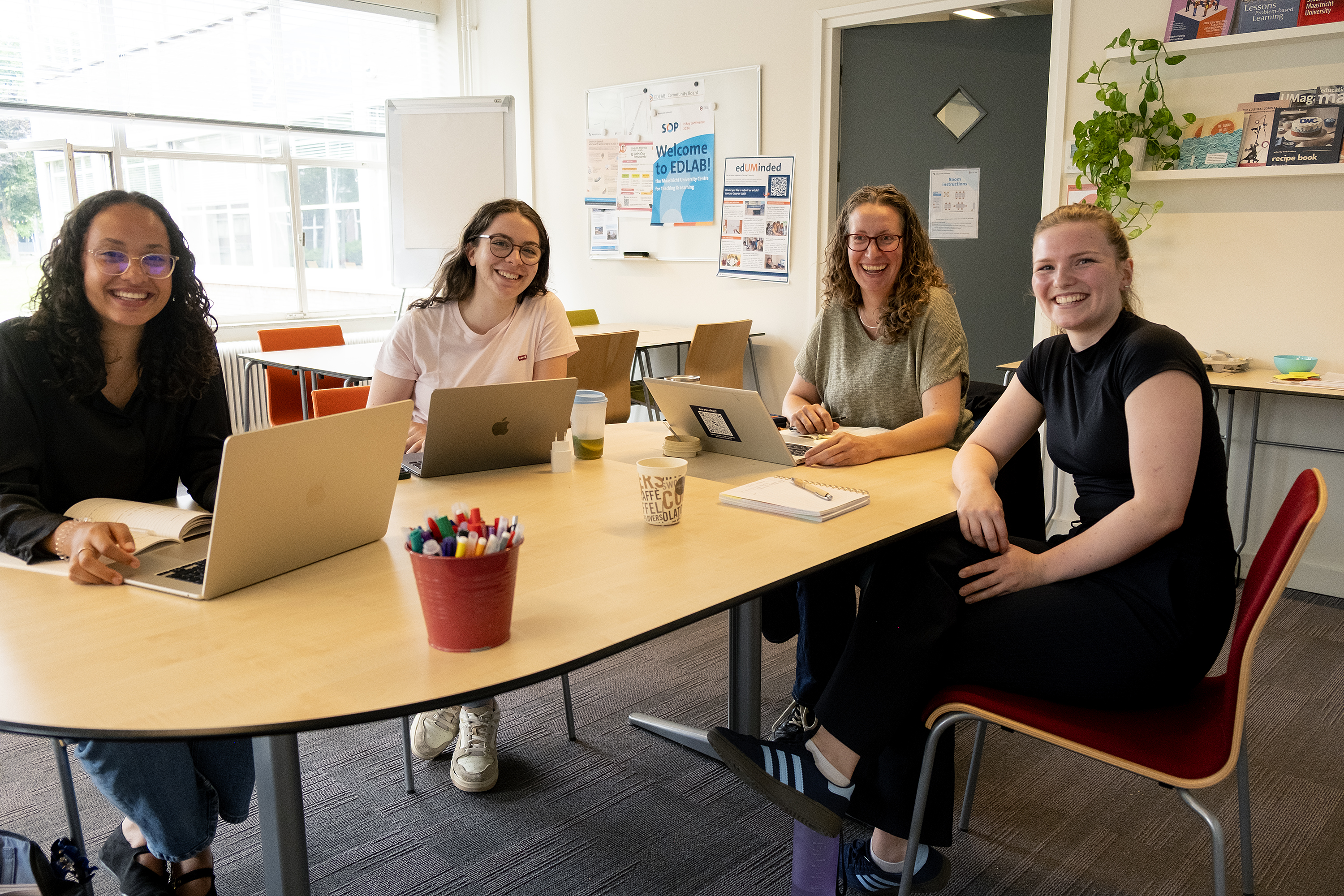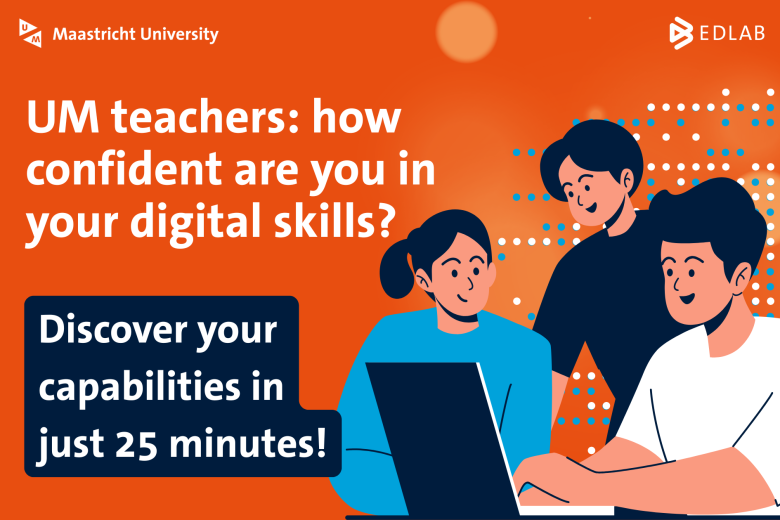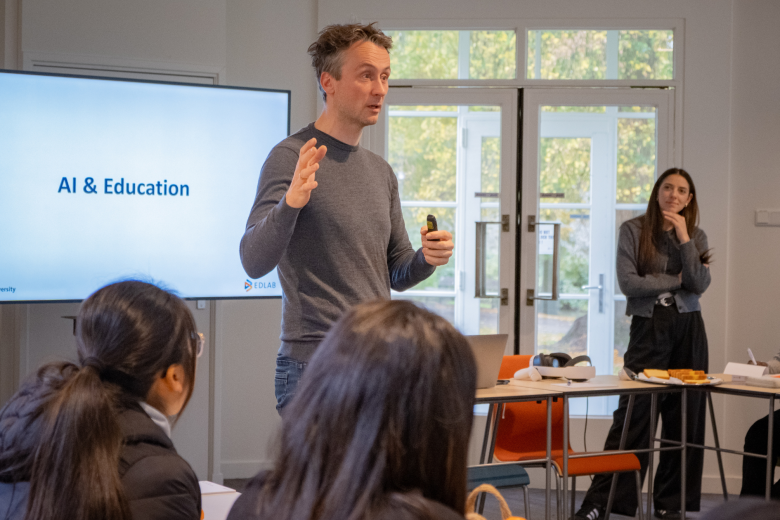Student guidance at Maastricht University: Emma Schroeder reflects on her Applied Research & Internship Project (ARI) at EDLAB
Emma Schroeder, a second-year student at University College Maastricht, is nearing the end of her six-month Applied Research & Internship Project (ARI) with EDLAB’s student guidance team.
Her project focused on improving how UM communicates about student guidance services, making sure the messages are clear, effective, and easy to understand.
We were curious to hear what she learned, so we asked her to share her experience: "I learned that I can have good ideas. Being new to a project can help you notice things others might miss."
What sparked your interest in education?
At first, I was mainly interested in psychology, especially in what shapes who we are. I think education plays a huge role in how we develop, especially in childhood, and it affects us later in life. That’s why I believe education needs to be well-designed to give everyone the best chance to succeed. In the future, I’d love to work in anything related to education, whether at the university level or in secondary education.
If you had to guess, how would your teachers describe you as a student?
They’d probably say I’m very organised. I like to get things done properly, not quite a perfectionist, but I do like things done the right way. I have high expectations for myself. If something doesn’t go perfectly, I’m not overly disappointed, but I am happiest when I create something impactful, whether academically or otherwise. I want to contribute something meaningful, not necessarily change the world, but add value to whatever I’m working on.
When you’re in class, are you also interested in paying attention to the teaching process?
I do a lot of observing, probably subconsciously as well. I can usually tell how much a teacher cares about their subject. If a teacher is really passionate and thoughtful about their course and assessments, students are more likely to engage. On the other hand, if a teacher seems uninterested, you can feel how that impacts motivation and the connection between the teacher and the students. I’ve had experiences where I wouldn’t want to take another course with a teacher because of that.
How did you come across EDLAB and decide to get involved?
I first heard about EDLAB when I saw an event, the Student Journey Game, last year. I found it interesting, though I wasn’t exactly sure what EDLAB was at first. Later, I looked into various EDLAB events and was curious to learn more about them. When the opportunity for this internship came up, I saw it was related to education, student guidance and communication, which I’m very interested in, so I applied.
What stood out to you in the EDLAB internship description?
The focus on student guidance really caught my attention because I’ve had good experiences with student support myself, especially with my academic advisor, who has been very helpful. It made me realise how important it is to have people supporting students throughout their academic journey. Also, through talking to friends, I learned that many students don’t even know about all the support services available, which I found surprising and interesting.
Did the term ‘student guidance’ make sense to you right away?
Yes, to me, it meant academic advising, support related to your academic path, like choosing courses, understanding what’s needed for your degree, or solving issues with registration. It’s distinct from emotional or psychological support, which is a separate area. It also encompasses personal/psychological support. Student guidance as a whole covers all the elements that go into helping a student along their journey at university, in my opinion. So, in that sense, both academic and personal support are encompassed by the overarching term of student guidance.
How was it like to work at EDLAB?
I started around January, first with an interview and then regular meetings. I was working part-time once a week, but now it’s full-time for a few weeks. From the start, I was asked how much guidance I wanted. I said I preferred some freedom to explore, but with support if needed. It’s been good, I have a lot of independence, but also support if I ask for it.
What was your main task during this internship?
The assignment was to develop a communication strategy to improve the visibility of student guidance services for students. The goal is to make these services more visible and accessible, so students know where to go if they need help or even if they just have a question but don’t know who to ask.
How did you approach this task?
I started by reading a lot of literature to understand what student guidance really means and what good student guidance looks like. Then I moved into thinking about communication, how to translate this into a strategy that makes guidance more visible and clearer for students. Now, I’m at the point of giving recommendations and wrapping everything up into a practical plan.
How are you planning to present your results?
Well, my job mainly involves writing a report. It’s about 3,000 words, covering the literature, my recommendations, and supporting materials. But beyond that, I’m working on a final set of recommendations presented visually, something like an illustration. The idea is to make it easy for people to understand without having to read the whole report, because not everyone has the time for that.
So, this visualisation will summarise the key points quickly?
Exactly. The illustration or visual document will highlight the recommendations with some detail. I’m also giving a presentation to our team and my academic supervisor to explain the reasoning behind the findings. The visual summary will be useful for people who want the main points quickly, and if they’re interested in the full details, they can read the full report. I’ll share it with the EDLAB team so they can use it as they see fit.
The interview continues after the image.

Did you come across any surprising findings or useful tips during your research?
One thing that struck me was how important it is to make people feel something. Emotions really influence how well a message sticks or how likely people are to engage with it. Think about watching a movie, you probably won’t watch one that doesn’t evoke feelings like happiness, sadness, or excitement. This idea of emotional connection is fundamental in communication theory and quite important.
That makes sense. Anything else that stood out?
Yes, student communication is most effective when it comes from students themselves. It’s easier to relate to someone who has a similar experience, like listening to advice from a sibling rather than a parent. Students trust peers because they understand what they’re going through. University communications often feel less personal and less relevant. This point really underlines why involving students in communication efforts, by students, for students, is so crucial. It’s also practical since many faculties already have student ambassadors and student-led events that can spread messages well.
Did working on the project help you discover services you hadn’t noticed through regular communication?
Exactly, and that led to some of my recommendations about communication. For example, I’d heard of the social safety team but didn’t know much about it. They deal with reports of inappropriate or undesired behaviour, which is reassuring. I also learned more about support for parents, which I hadn’t considered because I’m not one myself. And disability support, I knew it existed, but didn’t know the full extent. Since working on the project, I have noticed more about how the university is designed to support people with disabilities. I’m also more aware of messages from the social safety team and other services now.
What are some of those recommendations?
One big theme is using visual storytelling, videos, or posters. For example, short videos, about a minute long, where students share their experiences with specific services. These are easy to watch, share, and engage with. Posters with an image and a short quote or testimonial also could work well, especially if they’re both physical and online. Another recommendation is to have communications led by students and to tailor messages by faculty. If I get a message that feels unrelated, I’m less likely to pay attention. But if it’s targeted, like “this is for UCM students,” I’m more interested. Also, the timing of messages matters. For example, sending reminders or information the week before exams about stress support services can be very helpful. Targeted messages make it easier for students to seek help and help normalise reaching out, which reduces stigma.
Why do you think student guidance is important in a PBL environment?
PBL encourages students to be self-reliant academically, which is good for students. But it also creates a mindset that you should manage everything on your own, which isn’t always helpful. The university tries not to be overbearing or ‘baby’ students, but still needs to ensure people know where to find help. Finding the right balance, offering support without overwhelming students, is a challenge.
If there is one message you want people to take away from your work, what would it be?
That many people at the university really care. I hadn’t realised just how much support is available and how much effort goes into improving teaching and student experiences. It’s motivating to see this responsibility and care, and I want to show appreciation for it. Also, I think students should be aware of the guidance services they have access to because not every university offers this level of support. Even if you think your problem isn’t serious enough, there’s always someone who can help.
What did this experience teach you about yourself?
I learned that I could have good ideas. Sometimes, as a student, you feel like you have less experience, but fresh perspectives can be valuable. Being new to a project can help you notice things others might miss. Also, everyone’s student experience is different, so it’s important to respect those differences and trust that good ideas can come from anyone.
Interview by Sueli Brodin, Communications Advisor at EDLAB
Also read
-
Teacher Information Points at UM
UM faculties now host Teacher Information Points (TIPs) that offer local, “just-in-time” and on-demand support for teaching staff. The aim is simple: to provide help that is closely connected to day-to-day teaching practice.

-
As a teacher, how confident are you in your digital skills? Discover your capabilities in just 25 minutes
Maastricht University invites all teaching staff to take part in the Jisc Discovery Tool pilot to explore your digital strengths.

-
UWC Maastricht students get a taste of education innovation at EDLAB
On 21 October 2025, EDLAB hosted students from United World College Maastricht for the second year in a row, as part of their Youth Social Entrepreneurship programme.
